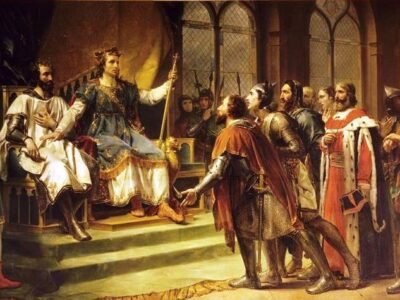Magnum Concilium, as long ago
You had been styled, when William made great show
At London, Gloucestershire, and Winchester,
Of your assemblies! Noble ancestor
Of what is now a squalid den of thieves
That, without shame, the people’s will aggrieves,
The vision of your pageants when the king,
With England’s crown upon his head, would bring
From forest palace to a midland town
The pomp of your processions of renown,
When round the sovereign throne the bishops stood,
And gaunt-faced abbots of the ashen hood,
Pillars of learning with their book-worn eyes,
Whose looks were as grave as their souls were wise,
The prelates in their gold-spun copes and clasps,
The crimson robes, the whole inspiring gasps
Of admiration and of filial fear,
To think that God should speak through men so near,
To whom the king shows special reverence
With place of honour, acts of deference;
And lords with silver quillions, ermine cape,
Buckled in gold and decked in silken drape,
Proud of bearing, towering of height,
Restless as stallions to present the plight
Of their dependents to the monarch’s court,
The interests of their vassals to support,
In lofty language arguing their case
With studied eloquence and measured grace;
Gave us to know, by such a dazzling sight,
That prudence would hold hands with truth and right;
For, you were guided by a higher form
To heaven’s ordered universe conform.
O how your ancient members’ souls must weep
To see the bunch your modern chambers keep!
The king, himself a subject of the throne
Of blessed Peter, governed not alone,
But with assistance of the Holy Ghost,
Upon receiving heaven’s mystic host
Through Christ’s anointed Vicar and his priests.
And thus the Council gathered on great feasts
Of solemn import and of highest rank,
The better earth’s and heaven’s King to thank;
Sometimes in abbeys would the Council meet,
Three hundred holy monks and friars to greet,
Whose fervent chanting at the hour of Lauds
Dispelled the power of the pagan gods
That now run riot in the modern House
Where men bow down to Satan’s chosen louse
And crippling chaos kicks each hornet’s nest,
Unleashing havoc at a clown’s behest,
As greedy factions cling to sinecures—
A Parliament of puffed-up epicures!
Of old, it was not so, as every man
From serf to king, to one eternal plan
Was bound by piety, or, lacking this,
The presaged promise of unending bliss,
If not avoidance of the fires of hell,
In everlasting bitterness to dwell,
As He who conquered death revealed to us,
Though our world deems His words superfluous.
For, serf and king, before the Holy Rood,
Alike had seen the Grail of His Blood
Raised up to God for their redemption’s sake;
Alike the flesh of Mary’s Son to take
Upon their tongues, that His divinity
Would flood their souls with His sublimity,
Infusing life where once the weight of death
Had sapped the mind or strained the spirit’s breath;
Alike, did every man, from serf to king,
In universal chant Christ’s praises sing,
One law of prayer expressing one belief,
One path of grace, one consecrated chief,
All nations following one moral rule,
From sunny Sicily to starry Thule,
Some died of sin, yet others died of love,
But all received their powers from above.
When William came to England, he was armed
With papal writ and left the state unharmed;
In earnest, Saxons begged him to reform
The chaos of that had come to be their norm:
The clerical neglect of discipline,
And forms of anarchy that now had been
The ruin of the people and their faith,
Who followed leaders’ deeds, not what they saith.
His feudal homage to the Holy Pope
Took forms that gave St. Gregory great hope:
The Church’s liberty the king secured,
Appointing honest bishops who insured
Ecclesiastical supremacy,
While saving Edward’s laws and clemency.
Wise counselors, good Odo of Bayeux,
Lanfranc, and Wulfstan, formed the king’s milieu.
And all remembered how the Norman duke
Endured most patiently a pope’s rebuke
Forbidding marriage to his future queen,
The pious Maud of Flanders, most serene,
Fair daughter of king Baldwin, well removed
In consanguinity, and most beloved
Of William who had summoned wise Lanfranc,
To plead with Nicolas. Twas thus that Caen,
Proud Norman city on the river Orne,
Received two monasteries that adorn
The province to this day: the one, for men,
By William founded and called Saint-Étienne,
The other, for the Holy Trinity,
Chaste Maud had offered, that virginity
Should reign among her lady anchorites.
With holy offices and Roman rites,
And chant from richly sculpted choir stalls
Resounding through the long abbatial halls,
These houses were the boast of Normandy,
A royal tribute to the Holy See!
(The lovers, well and truly marrièd,
Are each in their own abbeys burièd.)
Such men of wisdom, supernatural,
Were also eminently pastoral.
Good William knew that England should survive
As long as truth and Holy Faith would thrive
Among the people who had welcomed him
At Westminster, one Christmas Day so dim,
When he was crowned with their expressed consent,
In French and English shouting their assent.
By papal law, the Norman conquerors,
For having killed so many in these wars,
Would offer penances of charity,
Erecting churches with celerity,
None more than William who, in parallel,
Established on the spot where Harold fell
An abbey where the sons of Benedict,
Would all of eastern Sussex benefit.
Do tell, sad vassals of a foreign state,
What holy monuments did you create
Since Pugin rubbed your noses, through his art,
In your own history? In London’s heart
We see today but glass and iron towers
And each, more ugly than the next, now lowers
All Britain to the level of the brute
Whose horrid buildings are the rotten fruit
Of those who have forsaken their own past,
Barbaric wigwams never made to last!
Do tell, false Parliament of our own day,
Incompetent to honour yea or nay,
What consecrated princes of the Church
Are found among your members who besmirch
The very name of English Christendom,
O you who march to Europe’s godless drum?
With whom do you take council: Men of state,
Or pseudo-academics full of hate,
Unread in Latin, ignorant of Greek,
Whose English no true gentlemen would speak,
Who, lacking knowledge of philosophy,
Content themselves with pop theosophy?
Who are your clergy, who your patriarch,
Since bloody Henry jumped Salvation’s Barque?
Your temples, by apostates occupied,
Where sin and sodomy are sanctified,
The true religion parody and mock,
Transforming you into a laughing stock,
Since you to this New Order order genuflect,
To cosset the politically-correct.
Beware that once you bless depravity,
Your nation fall into barbarity!
In William’s day, the Parliament was true
To God’s commands, the opposite of you:
Before an altar, not some lowly board,
The knights in penance laid their sword,
And meditated on the life of Christ,
Whose gentle precepts perfectly sufficed
To serve as model for their noble gests
And raise their courage on their holy quests;
Whilst you, by contrast, every truth deny
Of all Christ taught, His every law defy;
Never is God upon your wagging tongues,
Never the Spirit’s breath expands your lungs;
Your own Prime Minister, his mother’s Creed,
For which many an English saint did bleed,
Rejects, before the world’s dark prince to bend:
As men thus fall, so fallen nations end.
Your shifty laws are now become a scourge,
The soul of Britain’s government to purge,
A punishment by God Himself imposed,
Whose throne your infidelity deposed.
With chaos as your guiding principle,
Your jumbled antics would be risible,
Did they not cause so great an injury
To Britain, waning now in misery.
Behold your dazed confusion amplified!
Who holds authority? You can’t decide.
Who works for whom? A seeming question mark.
Who sets the calendar? You’re in the dark.
Who runs the Government? It’s all a mess.
The Crown’s Prerogative? Feel free to guess.
Five hundred years you took to arrogate
The pilfered powers that your foes negate,
Five hundred years to raze the edifice
Of Christendom! And now, like Daedalus,
You’ve made a labyrinth you cannot escape,
As it incessantly evolves in shape!
Whoever breaks long-standing rules to bring
A vote, becomes your new, de facto king
Who issues orders with an iron fist
That only words and rhetoric resist,
Whilst judges disregard the oath they’ve sworn
And show for England their contempt and scorn.
How easily your enemies defeat
The whole of Britain through a false elite,
Whose lackeys, high-and-mighty, infiltrate
The sacred institutions of the state,
Suffusing their demonic tentacles
Behind the smoke-screen of their spectacles.
False sovereignty meanders here and there,
Apportioned now, now stolen unaware!
How are your monarchs crowned, or do you know?
Or from on high, pray tell, or from below?
Their substance is a shadow of what was:
Who “rules but does not govern,” neither does.
Did any raise a sword in England’s name
Upon a field of battle of great fame?
Mere stewards of Britannia’s decor,
These would be butlers in the days of yore,
When England’s orb and sceptre held the weight
Of sovereign dignity and royal state.
Did not their Tudor forbears loot and rob,
Run off with fiefdoms as their pompous mob
Broke off from all divine authority
By Christ bestowed on Peter’s primacy,
To raise false altars against Holy Church,
Whilst courtiers preened on winged ambition’s perch?
Today they let Neanderthals besiege
St. George’s Chapel, ending the prestige
Of centuries of royal majesty
By hitching Harry to a travesty
Of corn-fed rudeness and vulgarity,
Outstanding by her singularity.
Who would the royal blood adulterate
Is no defender of the British state!
When first the Fiend of Wittenberg his spell
Cast over England, it was then you fell:
The once-tall pillar of the Western Church
From Sacred Scripture hastened to diverge
To aid a king in his adultery
And ratify his crass effrontery.
Of his own sect the homicidal head,
His gall as dauntless as his faith was dead,
The blood of martyrs on his impious hands,
He spread grave error across English lands,
Like one who seweth weeds in place of wheat
Or serves but gristle in the place of meat.
Once Henry Tudor cursed the Son of God,
The blood of Christians flooded English sod;
The autocrat, by Cranmer’s hatred crazed,
Had fine old abbeys and their churches razed,
The monks dispersed, good Christians stretched on racks,
And holy abbots murdered by his axe.
The Heretic divine authority denied:
Henceforth but wolves would be the shepherd’s guide,
And false religions plague the human race,
Returning time to Adam’s fall from grace.
How many perished, fighting to preserve
The sacred order you had ceased to serve,
When you became the Devil’s rubber stamp
By joining Lucifer in Henry’s camp!
How strong was England that good laws had forged,
Before the mouth of hell its bile disgorged,
Dispensing death in every poisoned word
“Reformers” published to deceive the world!
Soon Henry’s bastard son would finish off
Once Christian England in a single huff,
Imposing Lutheran conformity
In one vile Act of Uniformity.
And ever since, a Parliament of fools,
Has served the Revolution’s garish ghouls,
Who by amendments or a wanton vote
Keep hell’s infernal boot on Britain’s throat.
For, they who seek to form the world anew
Succeed in merely bending it askew;
And they who strive the cosmos to transform,
The structures of society deform;
In order’s name they foster civil war
And welcome anarchy at mayhem’s door…
© Joseph Charles MacKenzie. All rights reserved.



Leave a Reply